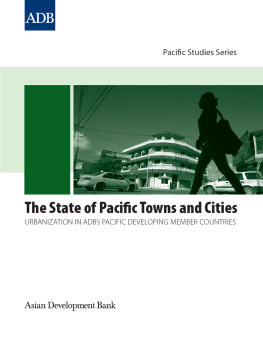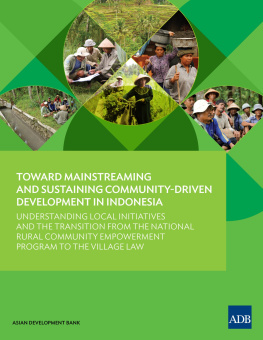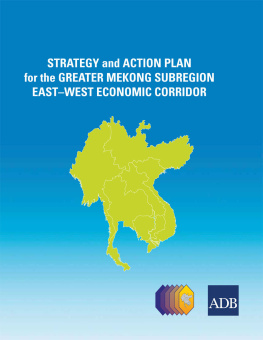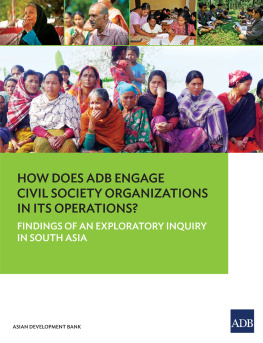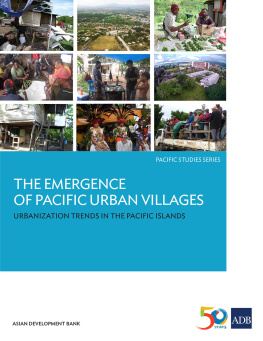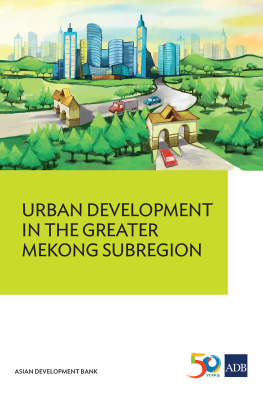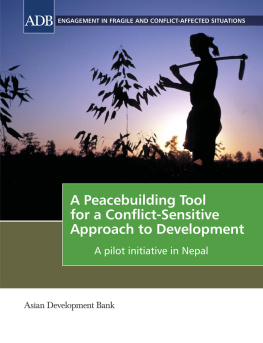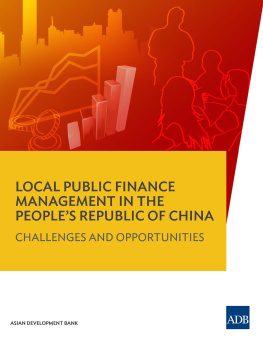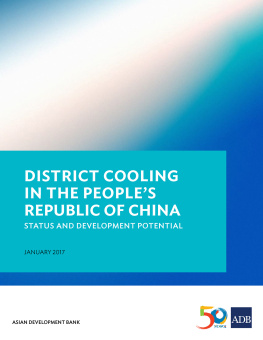Community-Based Routine Maintenance of Roads by Womens Groups
Guide for Communications Bureaus
Asian Development Bank
2011 Asian Development Bank
All rights reserved. Published in 2011.
Printed in the Philippines
ISBN 978-92-9092-361-9
Publication Stock No. TIM113426
Cataloging-In-Publication Data
Asian Development Bank.
Community-based routine maintenance of roads by womens groups: Guide for communications bureaus.
Mandaluyong City, Philippines: Asian Development Bank, 2011.
1. Roads.2. Womens participation.I. Asian Development Bank.
The views expressed in this publication are those of the authors and do not necessarily reflect the views and policies of the Asian Development Bank (ADB), its Board of Governors, or the governments they represent.
ADB does not guarantee the accuracy of the data included in this publication and accepts no responsibility for any consequence of their use.
By making any designation of or reference to a particular territory or geographic area, or by using the term country in this document, ADB does not intend to make any judgments as to the legal or other status of any territory or area.
ADB encourages printing or copying information exclusively for personal and noncommercial use with proper acknowledgment of ADB. Users are restricted from reselling, redistributing, or creating derivative works for commercial purposes without the express, written consent of ADB.
Note: In this report, $ refers to US dollars.
Asian Development Bank
6 ADB Avenue, Mandaluyong City
1550 Metro Manila, Philippines
Tel +63 2 632 4444
Fax +63 2 636 2444
www.adb.org
For orders, please contact:
Department of External Relations
Fax +63 2 636 2648
Developed under a pilot project in Dehong Prefecture, Yunnan Province, Peoples Republic of China
Contents
Tables and Figures |
Foreword |
Preface |
Acknowledgments |
Abbreviations |
Weights and Measures |
Routine Maintenance of Rural Roads |
Road Deterioration |
Road Maintenance |
Maintenance Activities |
Tools, Safety Equipment, and Materials |
Community-Based Maintenance Groups |
Maintenance Groups |
Group Size |
Selection of Group Members |
Registration of the Maintenance Group |
Training of the Maintenance Group |
Contracting Arrangements |
Performance-Based Contracting |
Planning for the Maintenance Work |
Inspection of the Maintenance Work |
Payments |
Maintenance Contract |
Sustainability and Replication |
Annexes |
1 Group Registration Form |
2 Cashbook |
3 Monthly Workplan |
4 Monthly Report |
5 Monthly Inspection Form |
6 Maintenance Contract |
Tables and Figures
| Tables |
| 1 | Seasonal Priority of Activities |
| 2 | Unit Rates for Maintenance Activities |
Figures |
| 1 | Road Deterioration |
| 2 | Corrective Maintenance |
| 3 | Preventive Maintenance |
| 4 | Impact of Routine Maintenance on Asset Value |
| 5 | Impact of Routine Maintenance on Overall Conservation Costs |
Foreword
Traditionally, rural road maintenance in Dehong Prefecture, Yunnan Province is carried out during 1 or 2 days a year through voluntary contributions from communities along the road. This is complemented by provincial and local maintenance subsidies for the purchase of materials to be used. In practice, the burden tends to fall disproportionately on women and the poor. Due to limited labor inputs and a lack of skills training, maintenance quality is generally suboptimal, hence, roads continue to deteriorate.
Through the Gender and Development Cooperation Fund (GDCF) pilot demonstration project, the Asian Development Bank reached an agreement with the Yunnan Provincial Department of Transport and the Dehong Prefecture Communications Bureau, to increase the funding for routine maintenance of rural roads and change the way it is used. This makes it possible to finance the remuneration of maintenance groups that work year-round to keep the roads open and to slow down road deterioration. Apart from improving the road conditions, this pilot project also provides a rare opportunity for off-farm employment in rural areas that tend to fall far behind urban areas in terms of job options, especially for women and ethnic minority groups.
The GDCF pilot project has achieved the following:
Some 165 kilometers of rural roads were successfully maintained by womens road maintenance groups. This resulted in continued access throughout the rainy season as well as improved road conditions, benefiting transport services and facilitating access to markets, schools, and health facilities.
A total of 490 people was provided with technical and management skills training in routine rural road maintenance, and was taught other income-generating activities. Some 163 women, mainly from ethnic minority groups, were employed in rural road maintenance. For the first time, the women were paid for their maintenance work. The flexible nature of the output-based payment system has enabled them to easily combine this work with other household and farm responsibilities.
Wages obtained from the maintenance work have provided a major boost to household incomes, raising these beyond the official poverty line and providing the women with greater decision-making power in their households.
The skills acquired to operate as maintenance groups and the quality of the maintenance work carried out, have demonstrated the potential of ethnic minority women. The status of these women within the community has improved and there is now a greater acceptance of their ability to participate in the management of public infrastructure.
The pilot project has also improved gender awareness at different levels and has provided complementary training on economic activities with the aim of increasing the livelihood options for women.
This approach to road maintenance by womens groups has the potential for wider replication in the Peoples Republic of China and in other developing countries. This guide provides a way to share the approach and methods used.
Tyrrell Duncan


